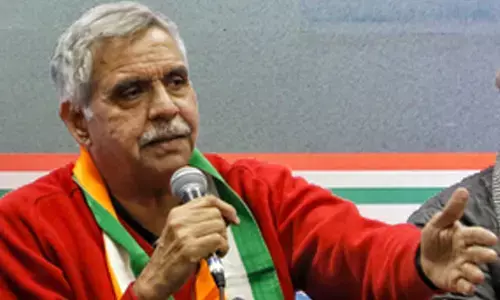RBI Must Prevent Capital Flight

For representational purpose only
Data provided by the Reserve Bank of India (RBI) tell us that the capital account of the country has been negative over the last three years. This means that the amount of capital that has come inward is less than the amount of capital that has gone outward from the country.
Data provided by the Reserve Bank of India (RBI) tell us that the capital account of the country has been negative over the last three years. This means that the amount of capital that has come inward is less than the amount of capital that has gone outward from the country. Indeed, the negative account has been greater during the months of the Corona crisis.
However, that does not explain the capital flight from the country because other countries were equally affected by Corona pandemic at those same times. Therefore, the flight of capital from Corona-affected India to another Corona-affected country cannot be because of Corona pandemic. There is a need for the Reserve Bank to work out policies to prevent this capital flight because, just as a family becomes poorer when an earning member of the family leaves, similarly, the flight of capital from the country will make India poorer.
Despite this hard reality, a committee established by the Reserve Bank has given four arguments to allow free movement of capital from India to foreign countries and vice versa. It argues that free movement of capital will increase the availability of capital in the country. It will encourage foreign investors to invest in India.
However, this alleged benefit is disproved by Reserve Bank's own data that shows that the capital account has been continuously negative in the last 2 years. The free movement of capital is leading to the flight of capital from; not the other way around.
The second argument given by the committee is that free movement of capital will reduce the cost of capital. This too is not correct because the outward flow of capital is reducing the availability of capital in India and accordingly the cost of capital in India is rising, not falling. The third argument is that it will make it possible for Indian companies to borrow in foreign countries and diversify their borrowing. This is correct. However, the fact that the more capital is going out of the country means that the diversification is not proving helpful in attracting foreign capital. The fourth argument is that free movement of capital will allow Indian investors to diversify their investment portfolio. At present an Indian investor may be investing in property and in share market in India. After free movement of capital, the Indian investors can invest in property in New York and in shares in the New York Stock Exchange. This benefit is correct. However, this is only beneficial for the richer section of the society because they alone have the capacity to invest in foreign countries. Outward foreign investment can prove beneficial to them but not to India.
The arguments given by the committee in favour of free movement of capital are certainly not beneficial for the country. Contrary to Reserve Bank's harmful policies, the International Monetary Fund (IMF) has advocated that the developing countries should consider imposing restrictions on free movement of capital to foreign countries in situations such as Corona pandemic. They have referred to the experience of Korea and Peru that have imposed such restrictions with beneficial results.
Free movement of capital can be much more harmful in the present situation.
The United States' Federal Reserve Board has adopted an easy money policy in the last few years. It has made available loans at an Interest rate of 0 to 0.25% per year. It is profitable for investors to borrow in the United States and invest that money in India at these low interest rates. The Federal Reserve Board has indicated that it is soon going to backtrack from the easy money and it is likely to reduce the money supply and that will in turn lead to increase in the interest rate.
If the interest rates in United States increase then it will be no longer be beneficial for foreign investors to borrow in the United States and invest in India because they have to pay high rate of interest in United States. On the contrary, such an increase in interest rates in the United States may lead to them to withdraw their money from India and repatriate it to the United States. Therefore, there is the need for the Reserve Bank to reconsider its policy urgently in view of the impending increase in the interest rates in United States' economy.
The policy of the Reserve Bank is also against its own recommendations. The committee has said that it is necessary to contain the fiscal deficit along with allowing free movement of capital. We know very well that the fiscal deficit of our country is increasing rapidly since the Corona pandemic. On the one hand, the Reserve Bank is saying that free movement of capital should not be allowed if fiscal deficit is not controlled; but on the other hand, it has increased the limit of the money that an Indian national can remit to the foreign countries for investment under the Liberalized Remittance Scheme despite the increase in the fiscal deficit.
An article in the Journal of Indian Association of Social Science Institutions has given four reasons for the flight of capital from India. First is corruption. The cost of doing business in the country is higher if there is corruption and foreign investors do not want to invest here.
Second is increase in government debt. This means that (1) the government will have to borrow more money; (2) the Reserve Bank will have to adopt easy money policy to make available the money that is borrowed by the government; (3) this will lead to inflation and to the devaluation of Indian rupee; (4) reduce the value of the investment that the foreign investors may have made in India leading to loss for them.
Third is negative capital account. A negative capital account leads to more outflow—somewhat like herd immunity. One foreign investor follows the other in taking capital out of India because negative capital account leads to devaluation.
Fourth is the adoption of free trade. Reason is that if our economy is not competitive then we will lose our ground in the global market and this will lead to capital flight.
I would like to add a fifth reason which is social conflict in the country. The social atmosphere has become so negative that foreign investors may not like to come. The time is at hand for the Reserve Bank and the Government of India to reconsider the policy of free movement of capital, which is leading to capital flight and lower rates of growth in the country.
(The author is former Professor of Economics at IIM, Bengaluru)
(The opinions expressed in this column are those of the writer. The facts and opinions expressed here do not reflect the views of The Hans India)
















